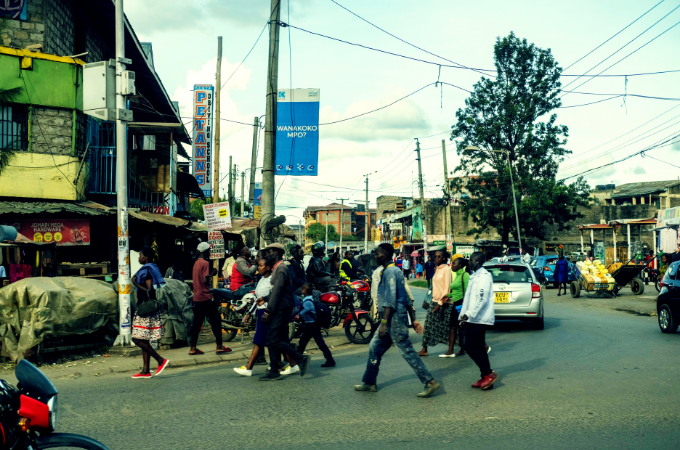
Your gaze is fixed right ahead, beyond a stream of people and a wall of parked matatus. Approaching, at breakneck speed, is a Super Metro from Thika Road. The space between where it is going to pass and the oncoming human traffic is where you are wedged. The driver has flashed his warning lights on you, but you will not stop nor give right of way. You walk right ahead as it approaches you. There’s an endless string of pedestrians trailing behind you in more of a hurry than you. You won’t move aside. You would if there was space. You keep your pace steady, no stopping. The manyanga isn’t stopping either. Here at Koja, no one stops for no one.
Someone is tugging on your shoulder, and his feet are nose-to-butt with your heels. “Brathe, this trouser. Clean jeans.” You say nothing. He is persistent. You keep walking. The matatu is approaching speedily. The other pedestrians are closing in on you. You have slowed down. You accelerate. And the jeans man follows suit. “Eight so solo. Clean denim. You can even look.”
“A hundred,” you say.
“Clean wealth. It’s in the fashion,” he adds, his pace even faster than yours, renewed by your interest.
“I only have a hundred,” you say stubbornly. Someone brushes past you, a gunia of plantains on his shoulders. One of them, sticking out of the sack, scratches your cheek. Thank God you moisturized. This rude man is closely followed by a mother carrying a traveling case, a duffle bag, a hand bag, a full shopping bag with Broadways bread peeping out its top, and tugging in her seventh hand, a small boy running to keep up with her.
“Five so basi. No adding,” the jeans man is running now. His hand is already holding your elbow.
“I only have a hundred.” You keep walking. The Super Metro nearly makes way with your head as you duck diagonally to leave it a tiny space to pass.
“Three hundred, mwisho.” The vendor throws the jeans on your shoulder and snakes the trousers around your neck expertly; in a manner that suggests he had done so a million times before. You keep walking like nothing has happened.
“Niko na so,” you add as you approach the controlled traffic at River Road crossing. The fire station is behind you now.
“Add chwani basi.”
You think, then remove a crisp five hundred note from your breast pocket. He fishes for change. You tuck the three hundred and fifty back and unwind the trouser off your shoulder. “Thanks.” But he has already left you. You see him haggling with a young lady, trying to sell another one.
You fold the jeans as you wait for the police to clear the traffic so that the mammoth crowd behind can cross with you. Earlier, you had seen the jeans and you had liked it. Then you had made eye contact with the jeans man, and you had communicated without communicating. He had followed you, both of you knowing that you were going home with that jeans tonight. You had been sly. You must be sly in Nairobi, otherwise, utagongwa. You had initiated the deal with absolute nonchalance like the legend you are, and now you had won the prize! Clean jeans. Clean wealth. It is so lovely. It would go so well with many of the gray shirts that you have. You leave Koja and point your toes down towards Globe, headed for Ngara.
***
Glossary
Brathe – brother
Clean wealth – mali safi
So – hundred shillings (Kenyan)
Mwisho – no adding
Niko na so – I only have a hundred (you definitely have more than that)
Chwani – fifty shillings (it can’t even buy smocha)
Smocha – come on! A snack made of a chapati and a smokie in the middle. Kachumbari is added at you honor’s request (sometimes with chilli and sauce)
Kachumbari – find that out for yourself
Koja – one of the five pedestrian and commuter frontiers in Nairobi, second only to BS in traffic (human), and closely followed by Nyamakima and OTC in crumminess
Utagongwa – you’d be sold things at ‘tourist prices.’ But you won’t realize until your friends ask you, “how much did you buy that jeans?” and you will tell them, “eight hundred.” And then they will laugh at you saying, “we uligongwa.”
Photo by Nicholas Gray on Unsplash










COMMENTS -
Reader Interactions